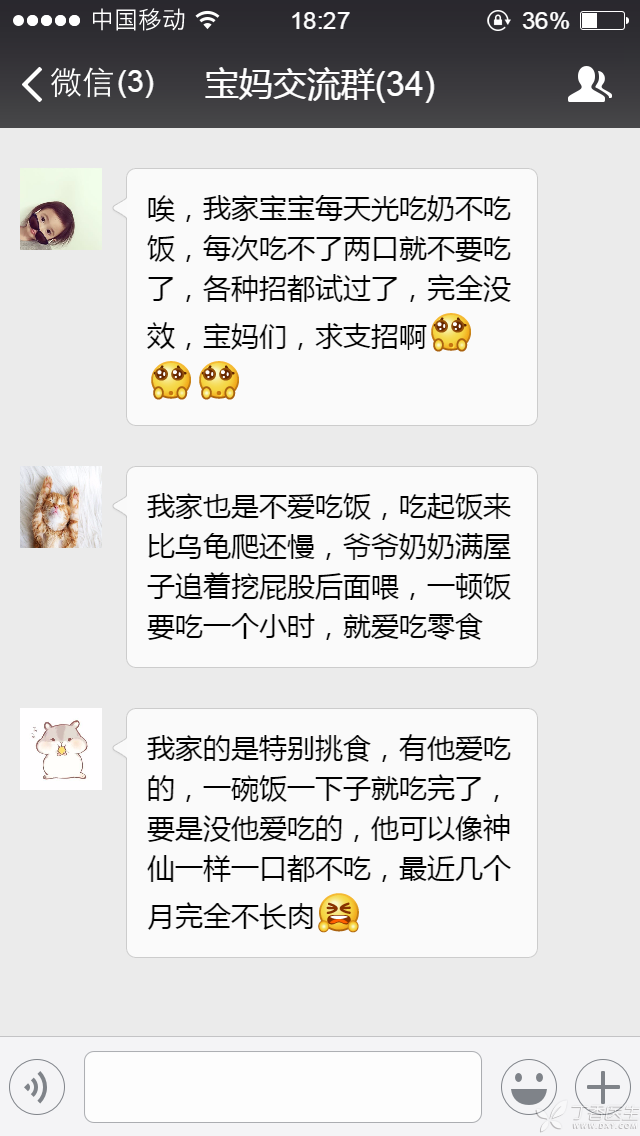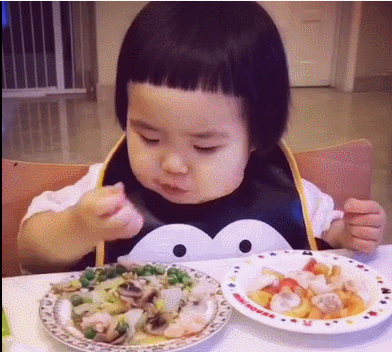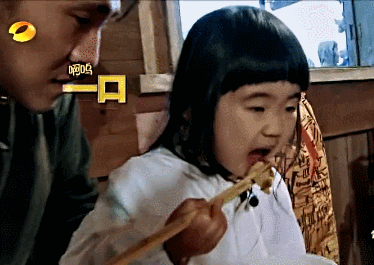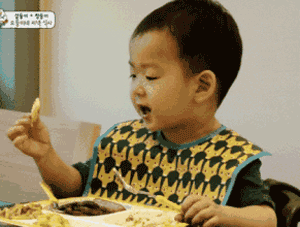
Babies don’t like to eat and have no appetite, which always makes parents break their brains.
In all kinds of popular mother groups and mother forums, what they see most is often all kinds of complaints from mothers about their babies’ eating problems…

Is the above dialogue very familiar? Does your baby have a lying gun?
If there is another family’s baby around, who eats big and never chooses food, but his own baby does not eat either this or that, then he will be even more tired…
Xiao Man, a new snack in the online red world, is the legendary baby of someone else’s family.

I believe many mothers will have a very complicated mood after watching Xiaoman’s meal video, including envy, jealousy and depression.
But more, I’m afraid it’s curiosity. Is curiosity a natural appetite for Xiaoman? Is it true that she was born in a family of food and beverage and has a super strong food and beverage gene?
Good appetite needs to be cultivated.
My son Tong Tong will officially turn 3 years old in a few days. Since his birth, his appetite has always been in good condition and is also the standard [other people’s baby].
Other precious mothers envy Tung Tong’s natural good appetite, but only I, the mother, know that Tung Tong’s good appetite is not born at all, but cultivated bit by bit.
Not only should we pay attention to the cultivation of children’s regular eating habits in daily life, but when we feel that children’s appetite is deteriorating, we should carefully observe the causes of poor appetite and try our best to stifle the problem in the cradle.
Only in this way did he develop a good appetite.
So, how did I train him step by step into a professional snack?
This is how [snack goods] are formed.
1. Meal with more care
Many children will have a bad appetite. One of the important reasons is that the food is too monotonous and the pattern will not change every day. Children will inevitably protest.
Frequent changes in patterns can not only make children feel fresh about eating all the time, but also make their diet more diversified and nutrition more balanced.
In addition to changing patterns, children can also appropriately increase the food they like to eat.
Adults will have a better appetite than usual in the face of their favorite tastes, and so will children.
Just like my son Tong Tong, he especially likes chicken soup and fish soup, which are delicious soups. Whenever this meal is accompanied by chicken soup, a bowl of rice will be eaten easily. When I found out this, I appropriately increased the frequency of chicken soup and fish soup.
Tung Tong likes cartoon-shaped food very much. Sometimes when the child’s appetite drops, I will pay more attention to the food preparation and put the food into various lovely shapes, such as Mickey shape, tiger shape, etc. The little guy’s enthusiasm for eating immediately comes up again.
2. Limit snacks
Some parents are always in the idea of [parents think you are hungry], giving their children fruits and yogurt, and then letting them eat biscuits and taste snacks.
Babies’ appetite is already much smaller than that of adults. If their mouths keep going before eating and their stomachs are filled up by the time of dinner, how can they eat obediently?
Therefore, children must be limited to snacks. Especially one hour before meals, children should be prevented from eating too much.
If the child feels hungry, he can eat a little fruit, but pay attention to leaving the baby’s stomach for dinner.
Step 3: Eat a light diet
Many elders feel that their children do not have the strength to eat salt. They add salt to their children’s supplementary foods early and abruptly cultivate their children with [heavy taste].
After a child has tasted a heavy taste, it is difficult to value ordinary light food any more.
Therefore, in order to prevent the baby from being picky about food and not loving eating, and also for the sake of the baby’s health, parents should teach the baby to form the habit of light diet from an early age.
No extra salt will be added within 1 year old, and a light diet will be maintained within 3 years old, so as to keep the baby’s food authentic as far as possible.

4. Use cartoons skillfully to solve the problem of eating.
In fact, no matter how good the appetite is, there will be one or several foods that you don’t like.
For foods that children don’t like, sometimes they can use the power of [role models] to stop picky about food with the help of cartoon images that children like.
Tung Tong doesn’t like carrots very much. He eats very little carrots in the food every time.
Although I will not force my child to eat, I still hope that he will not be picky about food.
Just in time, I took my child to see < < Zootopia > > some time ago. My son likes Judy very much and thinks she is smart and powerful.
I had a brainwave and said to my son, [Look, Judy is so good because she loves carrots. Does Tong Tong want to be like Judy? ]
Hearing this, the son said excitedly, “Tung Tong should also eat carrots and be as good as Judy.”
Later, when there were carrots in the meal, he gulped them down and told me after eating, “Tong Tong should be as good as Judy!” ]
Children sometimes refuse to eat obediently because of playing with toys or watching TV. At this time, cartoons can also be used to make children understand that they should eat on time.
Tung Tong has always liked watching Qiao Hu very much. There are several episodes about eating.
For a period of time, Tong Tong always only cared about playing with toys and ignored him when he was asked to eat. I consciously found out the episode of “I love eating” for him.
After that, every time I said, “Baby, it’s time to eat.”
The son will obediently put down his toys and sit on the table like in the cartoon to prepare for dinner, humming the song of eating in his mouth.

5. Create an atmosphere of concentrating on eating.
Children’s attention is easily distracted. If there are toys or TV beside them when eating, children’s attention will easily be attracted by toys and TV. Where will they have the mind to eat?
Therefore, when the child eats, the toys are put away and the TV is turned off so that the child can concentrate on eating.
6. Don’t shut out snacks completely
Although the number of snacks for children should be limited, it is not necessary to completely shut out snacks.
Sometimes, children want to eat snacks just because they feel very fresh and do not give them to their babies at all, which will only make them more curious about snacks and want to try them more.
When parents choose snacks for their children, they can choose some relatively healthy snacks to properly satisfy their children’s desire to eat snacks.
For a period of time in Tongtong, I had a very strong desire for lollipops. At that time, I did not blindly prohibit children from eating them. Instead, I chose several lollipop products made of organic fruits and shared them with my son.
Soon after, he didn’t have such a desire for lollipops, and now there are almost no lollipops in his life, because lollipops are no longer fresh to him, but just a little sweet.
STEP 7 Don’t chase after me
Many parents see that their children do not eat, or that their children do not eat after only two bites, they will rush to pick up the bowl and chopsticks, chase after the children’s buttocks and feed them, and take advantage of the children’s inattention to feed them.
If the child does not want to eat during the meal time, parents should not chase after him. As long as they make it clear to the child that if they do not eat now, they will only have food until the next meal. Moreover, there is no other food during this period, so set the rules for children to eat on time.
Parents chasing after feeding is not only not conducive to the children to form the good habit of eating independently and on time, but also because the children’s attention is not on food, it is difficult to accurately sense the signal of satiety, and it is easy for the children to eat too much.
Moreover, sometimes, the child does not eat or eats less, just because he is not hungry or already full, parents should not always use their own ideas to control the child’s hunger and satiety.
Eating, as the most basic survival need, does not need to be reminded at all. The child knows best whether he is hungry or not. Parents should not always think that the child [is not full] needs to be fed more.
8. Be patient and tolerant
For parents, sometimes they really need a strong heart to tolerate their children’s occasional misbehaving and stubborn temper.
Blindly criticizing cannot solve the problem, sometimes it will even make the situation worse and arouse the children’s rebellious mentality.
If the baby always eats well at ordinary times, then the mothers will also give the baby more tolerance if he does not eat well once or several times occasionally.

Therefore, don’t attribute the child’s lack of appetite to [it’s too hot].
If you are worried about your child’s eating problem, you may as well combine the above suggestions and try to find out the real [root] of your baby’s dislike of eating. Perhaps the next online food sensation is your baby.
